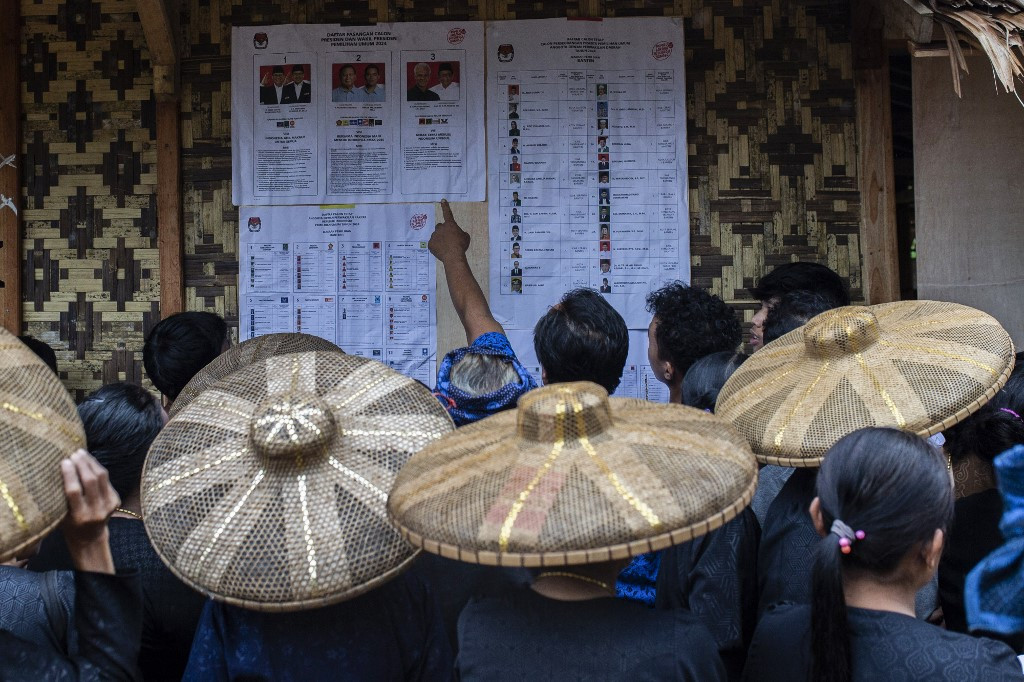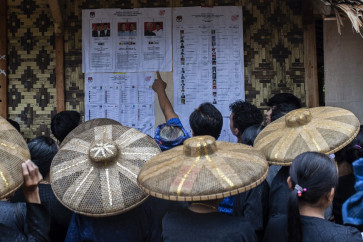Popular Reads
Top Results
Can't find what you're looking for?
View all search resultsPopular Reads
Top Results
Can't find what you're looking for?
View all search resultsEnhancing electoral inclusion for indigenous peoples
The lack of specific laws that recognize and protect the collective rights of indigenous peoples to their traditional lands and cultures complicates their ability to participate fully and effectively in elections.
Change text size
Gift Premium Articles
to Anyone
 Members of the indigenous Baduy tribe check the candidate list at a polling station on Feb. 14, 2024, before they cast their ballots and vote in Indonesia's presidential and legislative elections in Kanekes Village, Lebak, Banten province. Voting began on Feb. 14 in Indonesia's presidential, national and provincial elections at more than 800,000 polling stations across the country, with nearly 205 million people eligible to cast their ballot. (AFP/Aditya Aji )
Members of the indigenous Baduy tribe check the candidate list at a polling station on Feb. 14, 2024, before they cast their ballots and vote in Indonesia's presidential and legislative elections in Kanekes Village, Lebak, Banten province. Voting began on Feb. 14 in Indonesia's presidential, national and provincial elections at more than 800,000 polling stations across the country, with nearly 205 million people eligible to cast their ballot. (AFP/Aditya Aji )

Indonesia, the world's third-largest democracy, is home to an estimated 50 to 70 million indigenous people spread across our sprawling archipelago. Despite our democratic advances, indigenous communities often face systemic barriers to electoral participation.
In the 2019 general election, the voter turnout was approximately 80 percent, reflecting a high level of engagement across the nation. This trend is expected to have continued in the 2024 election, although the data will only be available when the General Elections Commission (KPU) completes its real vote count.
However, data specifically concerning indigenous peoples' participation is much less straightforward, primarily because of the absence of disaggregated data on voter turnout among these communities. Anecdotal evidence suggests that while some indigenous communities actively participate in elections, others, especially those in remote areas, face significant barriers that limit their engagement.
The Nusantara Customary Community Alliance (AMAN), an organization representing indigenous peoples in Indonesia, has highlighted challenges such as a lack of access to polling stations, insufficient election-related information and the broader issue of unrecognized land rights, as key factors impeding indigenous participation.
The inclusion of indigenous peoples in electoral processes is often overshadowed by broader political and economic priorities. These communities frequently find themselves at the margins of national development agendas, where their rights to land, resources and political representation are recurrently compromised.
The systemic barriers to the inclusion of indigenous peoples in Indonesia's electoral processes are multifaceted. They include logistical challenges in reaching remote areas, a lack of information and education on electoral rights and processes in local languages and issues related to land rights and recognition of indigenous identities.

Indonesia's legal framework, while supportive of indigenous rights on paper, including in the 1945 Constitution and the 1999 Human Rights Law, often falls short in implementation. The lack of specific laws that recognize and protect the collective rights of indigenous peoples to their traditional lands and cultures complicates their ability to participate fully and effectively in elections. Additionally, the logistical challenges of reaching indigenous communities in remote and often inaccessible areas exacerbate their exclusion from the electoral process.

















